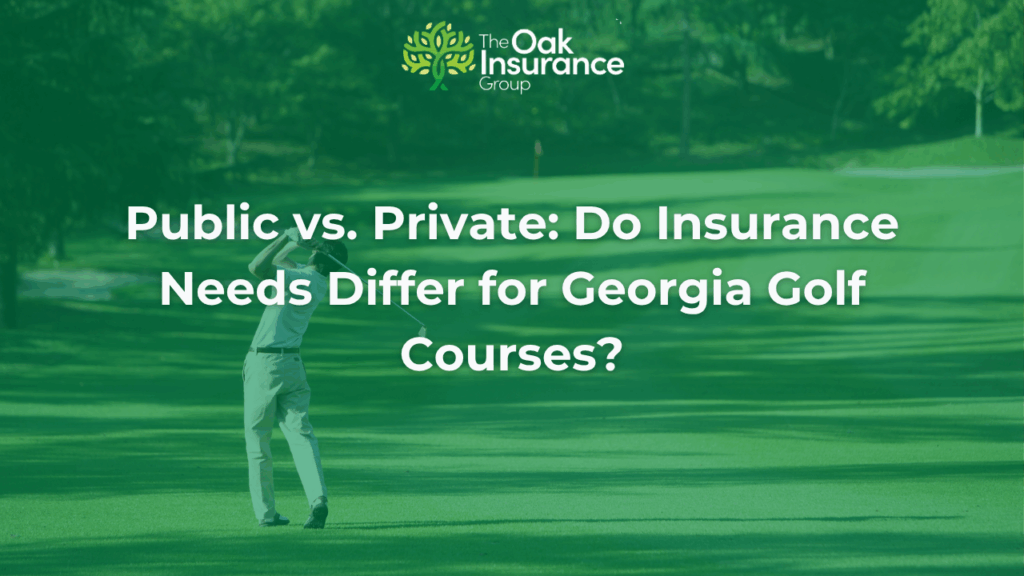
Are you unsure whether your golf course’s insurance actually covers your unique risks?
Wondering if your policy needs differ because your course is private—or open to the public?
Golf courses in Georgia face a broad range of liability and property risks, but public and private operations aren’t created equal in the eyes of insurance. Their operational models, customer interactions, and even their legal vulnerabilities shape vastly different insurance needs.
In this guide, you’ll learn how insurance requirements vary between public and private golf courses, the Georgia-specific regulations that impact coverage decisions, and the essential policies every course should carry to mitigate risk and control costs.
We’ll cover:
- Operational differences that drive insurance needs
- Key coverage variations between public and private courses
- Georgia-specific legal and insurance considerations
- Emerging threats like cyberattacks and pollution liability
- Cost factors and how to manage risk efficiently
Public vs. Private: The Operational Divide That Drives Insurance Needs
Your course’s business model is the foundation for your insurance plan.
Private golf clubs operate on a membership model, offering exclusive access, premium facilities, and frequent private events. This structure results in:
- Higher property values
- Specialized coverage needs (e.g., member property protection)
- Liability focused on private events and member-guest dynamics
In contrast, public golf courses are open to all. Often run on daily-fee revenue, they experience:
- High foot traffic and transient customers
- Broader public liability exposure
- Unique regulatory challenges—especially if municipally owned
| Feature | Private Golf Club | Public Golf Course |
|---|---|---|
| Access | Exclusive, members-only | Open to the general public |
| Revenue Model | Dues, initiation fees, private events | Daily fees, concessions, public events |
| Customer Base | Members and guests | High-volume, varied skill levels |
| Primary Liability | Member-guest incidents | Broad public incidents |
| Property Value | Higher-end amenities and structures | More basic facilities |
Coverage That Reflects Reality: What Each Course Type Needs
Every golf course needs core insurance—but the emphasis and limits differ.
General Liability Insurance
Public courses must prepare for a higher frequency of minor incidents due to constant public access. Private clubs see fewer claims, but with higher potential severity, often tied to events or exclusive gatherings.
Property Insurance
Private clubs with high-end facilities and amenities require higher property limits. Public courses need coverage that ensures replacement costs for carts, turf equipment, and buildings—even if less luxurious.
Business Interruption
Private clubs should protect income from dues and event bookings. Public courses are more vulnerable to loss of daily green fee revenue, especially when weather or damage limits playability.
Professional Indemnity (E&O)
If your course offers instruction, this is non-negotiable. Public courses often serve a wider range of golfers, making them more exposed to E&O claims than private clubs with long-standing members.
The Georgia-Specific Insurance Landscape
Municipal Sovereign Immunity
Municipal courses in Georgia face a legal paradox. State law provides sovereign immunity—unless the city buys liability insurance. Then, immunity is waived. That means choosing coverage could increase legal vulnerability even as it offers protection.
Workers’ Compensation
In Georgia, any course with three or more employees—part-time or seasonal—must carry workers’ comp. That includes groundskeepers, pro shop staff, and seasonal cart attendants.
Dram Shop Laws & Liquor Liability
Serve alcohol? Georgia’s Dram Shop Law makes your course liable for damages caused by overserved or underage patrons. Liquor liability coverage is essential, especially for beverage cart operations and bars.
Emerging Threats: Risks You Didn’t Face 10 Years Ago
Pollution Liability
EPA scrutiny is rising. Golf courses must now contend with potential liability for:
- Fuel or chemical leaks
- Groundwater contamination
- Pesticide drift
- Stormwater runoff
Pollution liability insurance is a must-have—not a maybe.
Cyber Liability
If you accept online bookings, store member data, or run POS systems, you’re a cyber target. Data breaches can cost tens of thousands in recovery, fines, and lost trust.
Cyber insurance helps with breach recovery, ransomware, and PR damage control.
Employee Theft
Courses dealing in cash, merchandise, and inventory are vulnerable to employee dishonesty. Crime coverage can protect against fraud, forgery, and theft.
What Drives Golf Course Insurance Costs?
Many variables impact premiums:
- Location: Georgia courses in coastal or flood-prone areas pay more
- Course Size: Larger or multi-facility courses cost more to insure
- Amenities: Restaurants, bars, or pools drive up liability
- Claims History: Clean records reduce premiums
Proactive Risk Management: Lower Costs and Improve Safety
To control insurance costs and protect assets, every golf course should:
- Conduct regular inspections to identify hazards
- Train staff in safety protocols and alcohol service
- Use clear signage for risky areas
- Install netting or barriers near property edges
Conclusion: Understanding Your Coverage Is the First Step Toward Protection
After years of managing a golf course, you’ve likely faced confusing insurance questions that don’t come with easy answers.
Now, you’ve seen the clear distinctions between public and private course risks—and how Georgia laws complicate decisions. Whether you’re protecting high-end amenities or shielding a city-owned course from lawsuits, your insurance strategy must be specific to your operation.
The next step? Schedule a personalized coverage review with an insurance expert who understands the Georgia golf industry.
Make sure your policy actually protects what matters most—before you need it.

